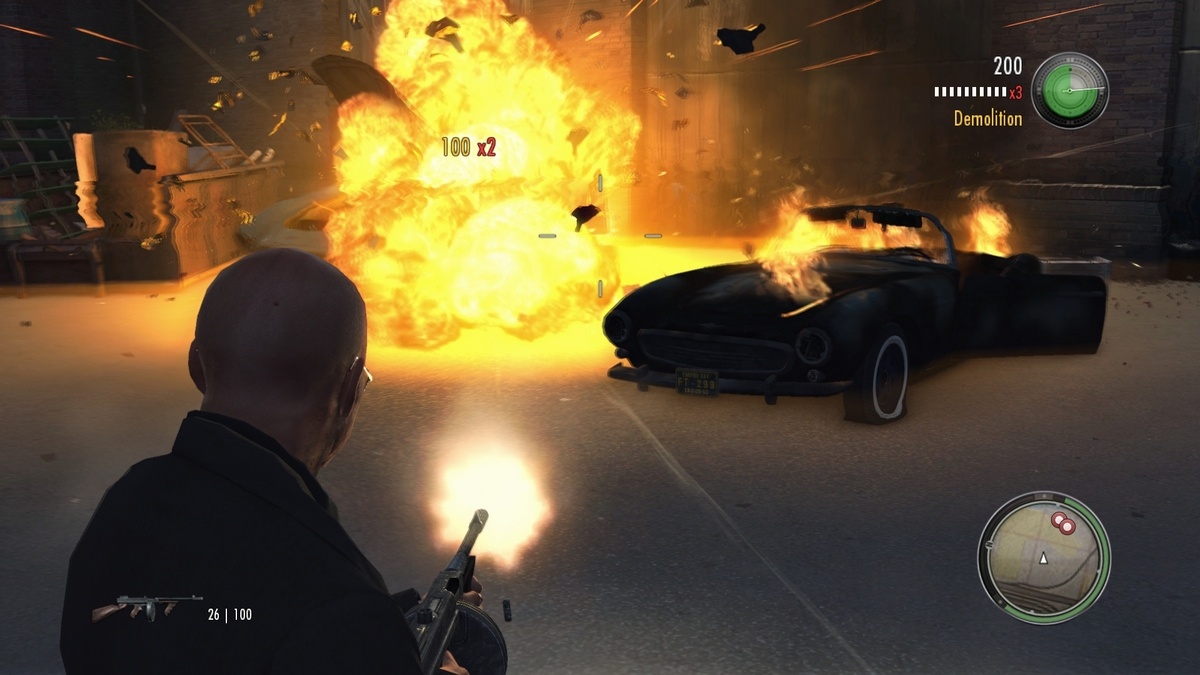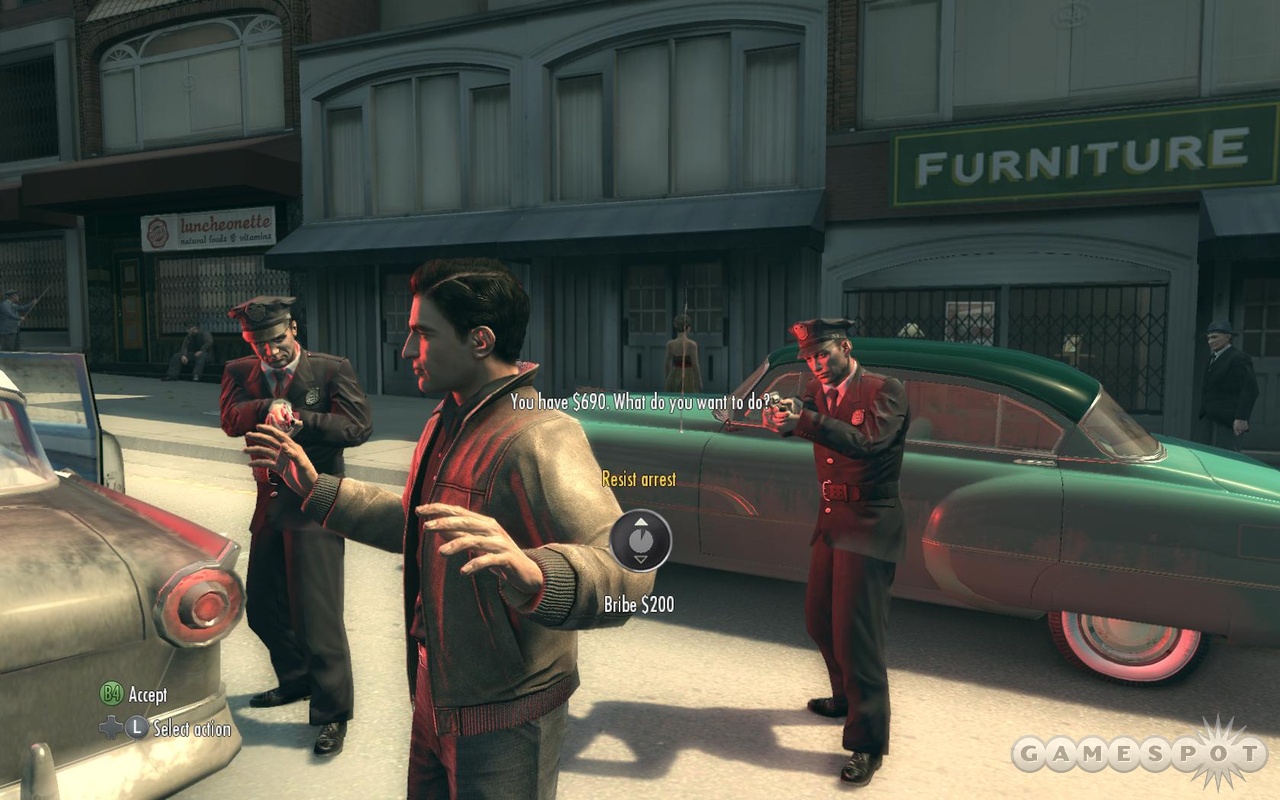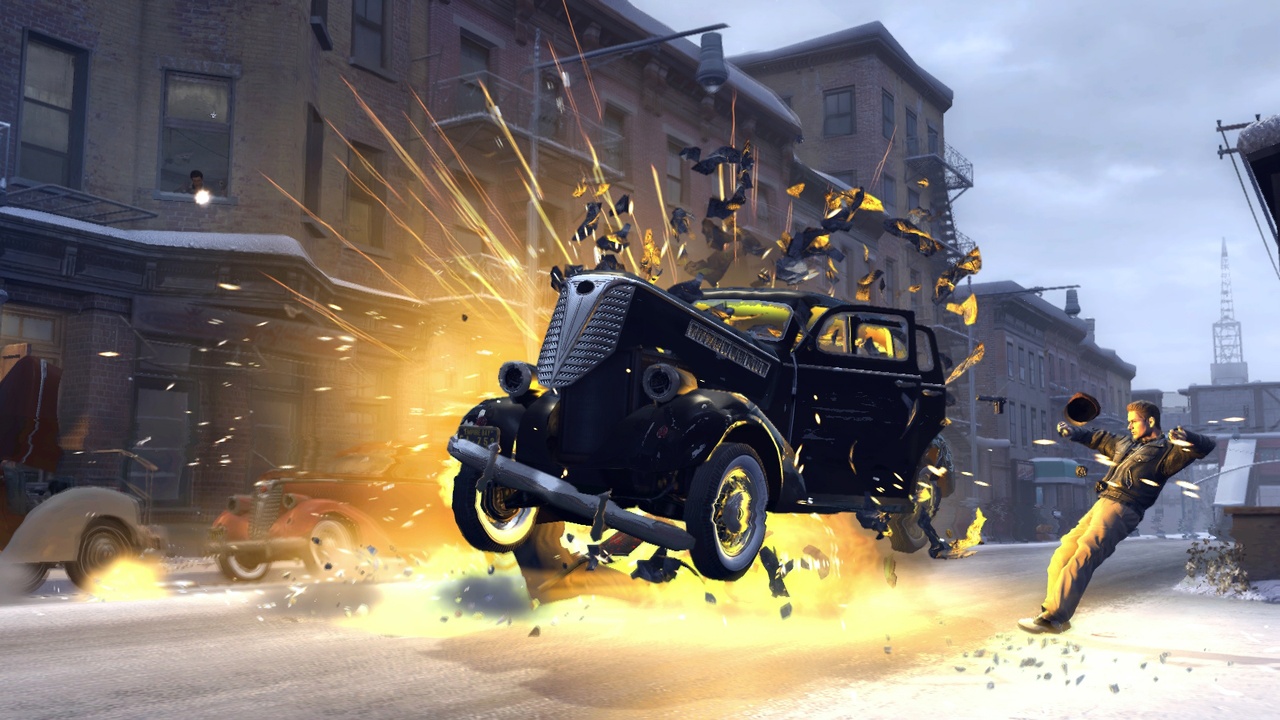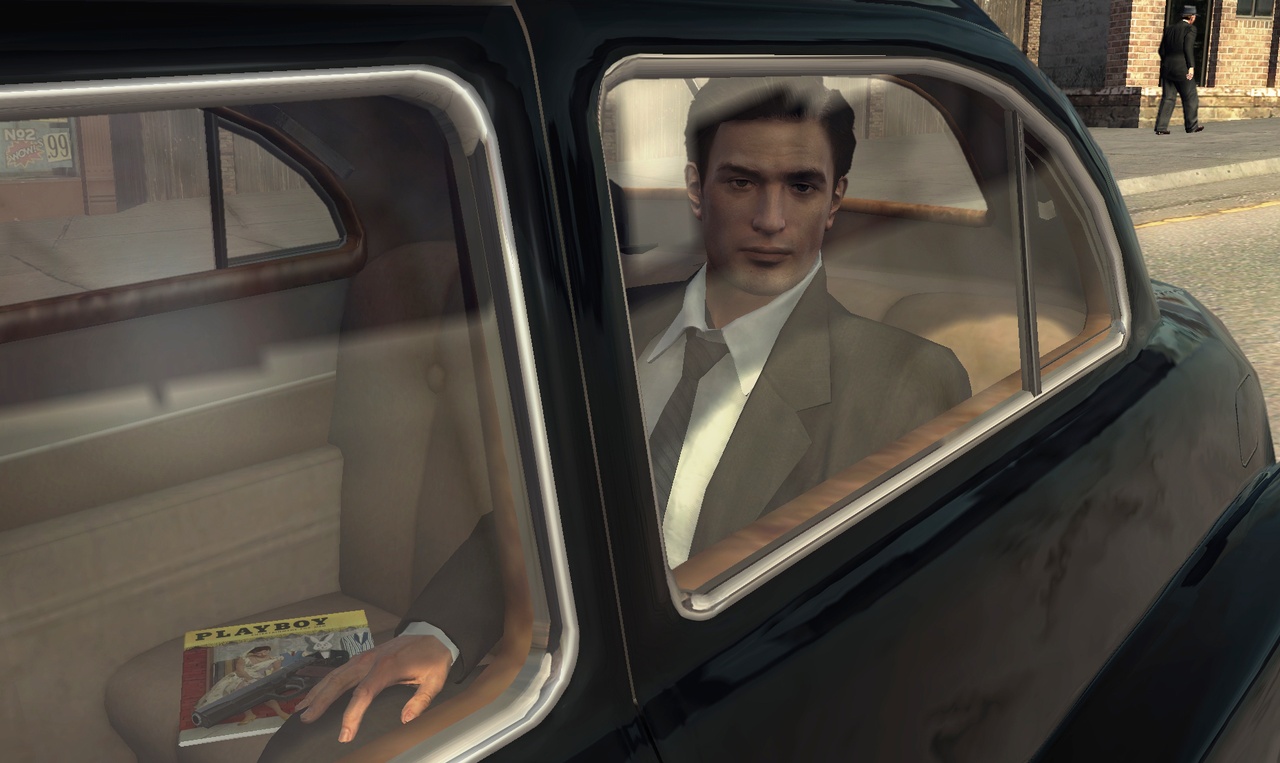Sound Byte: Mafia II Exclusive Soundtrack Download
Come listen to several orchestral scores from the Mafia II soundtrack and see what it takes to create the right mood for this action adventure.
 Before I jump into the two interviews, I'd like to share five exclusive tracks from the Mafia II soundtrack, courtesy of 2K Games. Mafia II is a blend of original music, as well as licensed tracks, which help re-create that 1940's atmosphere. It's one of the more memorable scores of 2010, so take a listen and tell me what you think in the comments below!
Before I jump into the two interviews, I'd like to share five exclusive tracks from the Mafia II soundtrack, courtesy of 2K Games. Mafia II is a blend of original music, as well as licensed tracks, which help re-create that 1940's atmosphere. It's one of the more memorable scores of 2010, so take a listen and tell me what you think in the comments below!
Below you'll find a Q&A with Jack Scalici, the director of creative production at 2K Games who worked as a lead writer, music supervisor, casting director, and voice director for Mafia II. That's quite a list! He worked on choosing licensed tracks for the game and sticking them in appropriate places, so if you're curious, continue reading. I know we generally like to do a video component, but unfortunately, the composer, Matus Siroky, is in the Czech Republic. Skip over to the third page of the blog if you want to read what he has to say about how he got his start and what it was like working on Mafia II. Enjoy!
Stellar Blade - (Almost) All Outfits River City Girls 2 - New Playable Characters DLC Reveal!! Sand Land Review That Time I Got Reincarnated as a Slime ISEKAI Chronicles – Official Announcement Trailer Paper Mario: The Thousand-Year Door – Official Switch Overview Trailer MEGATON MUSASHI W: WIRED – Official OP “MUSASHI English Ver.” Trailer Granblue Fantasy: Relink - New Content Trailer Modern Warfare III - New Season 3 Reloaded Modern Warfare Zombies Update Stellar Blade - Official Launch Trailer | PS5 Games Gothic 1 Remake | Official Collector's Edition Trailer SaGa Emerald Beyond – Official Launch Trailer Another Crab's Treasure Is A Soulslike 3D Platformer | GameSpot Review
Please enter your date of birth to view this video
By clicking 'enter', you agree to GameSpot's
Terms of Use and Privacy Policy
GameSpot: Tell us about yourself and your role on Mafia II.
Jack Scalici: I've been in the game industry for about 12 years now, and I'm lucky to have worked on so many fun projects. At 2K, I'm director of creative production. My team and I deal with things like a game's story, dialogue, casting, voice-over recording, mo-cap, cutscene and trailer production, orchestral score, and licensed music. All the fun stuff, basically.
For Mafia II, in particular, I took a personal interest in the game and functioned as lead writer, music supervisor, casting director, and voice director. Unlike most of our other projects, I actually became part of the dev team for a while.
GS: How do you decide what tracks make it into the game and what doesn't?
JS: Early on in development, I requested submissions from all of our regular partners in the music industry and a few smaller labels we discovered when we were working on BioShock. I asked for everything recorded between 1920 and 1960. I ended up with thousands of songs from around a dozen different licensors' catalogs. I listened to almost nothing but this music for a long time and ended up with around 1,000 songs that I liked. I kept on listening to those songs, especially as I worked on the game's script, and eventually narrowed it down to what you hear in the game. What you have in there are the songs I didn't find annoying after listening to them a few thousand times.
I should point out that game's story actually ends in the early 1950s, but I didn't want us to miss out on the phenomenon of rock and roll, so I put the cutoff date for the music at 1960, though I did allow a few songs on the soundtrack that were recorded after 1960. If it sounded like early rock and roll, no matter when it was recorded, it was fair game. Only one reviewer considered this a negative, but, hey, you can't please everyone all the time, right?
As for why a song that's on our wish list doesn't make it into the game, there are many factors.
The rule we operate under is that no song is sacred. We don't consider any particular song necessary to ship the game. If a licensor makes things unnecessarily difficult for us or if licensing a certain song presents too much of a risk, the song gets cut and we move on. It breaks your heart sometimes, but it's the only way you keep your sanity and avoid potential lawsuits.
Another factor is the artist and the songwriter--or their estate. Many of the biggest artists and songwriters have a say in whether or not their music can be licensed for a particular game, movie, TV show, etc. If the artist or songwriter has passed away, their estate makes those decisions. There were a few of these artists, songwriters, and estates that declined to be part of the game. Unfortunately, some people still don't consider video games a legitimate medium. Others were scared away by the game's title and subject matter.
GS: Do you take into consideration what the fans want?
JS: "F" the fans. Just kidding. I try. Most of the feedback I got from fans was that Django Reinhardt and Louis Jordan were their favorite artists from the first game's soundtrack. I completely agreed and made sure those artists were featured on the soundtrack of Mafia II.
GS: How do you determine where a particular track will fit in the game?
JS: It wasn't easy. One thing that really helped was that I was working directly on the script with the team, so I knew the game inside and out. Once I had narrowed down the potential soundtrack list to about 500 songs, I categorized each song by things like tempo, mood, subject matter of the lyrics, etc. When the game got to a playable state, I looked at each segment of gameplay where music could be used and matched it up with one or more songs that fit. This presented another issue though…the radio.
Every game I can recall playing that has a radio system does it in one of two ways. They either have a linear radio system, meaning everything you hear plays in one order and then it repeats, or they have a randomized radio system where a pool of audio assets are played randomly, which is like having your music player on shuffle. Neither of those solutions was going to work for Mafia II. The last thing I wanted was for "Boogie Woogie Bugle Boy" to play during the darkest moment in Vito's life.
The solution I came up with was a scripted radio system. I think this was the first time in my career where I described an idea to a dev team and they didn't look at me like I was crazy. Here's how it works: Each time the player isn't already listening to music (meaning Vito is on foot and he cannot hear a radio or jukebox from where he's standing) and he enters a car or another location where music can play, that is defined as a new gameplay segment. Each gameplay segment has a number assigned to it, and all radio stations have a unique playlist associated with each gameplay segment number. In addition, and most importantly, this lets me control which song the player hears first when the radio or jukebox starts playing.
For an example of how this works, look at the end of the chapter named "Balls and Beans." I'll set the scene for you: Vito has just rescued two of his associates and has caused the death of Luca Gurino, a man who was responsible for a lot of hardship in his life. Vito (and the player) is feeling like a total badass at this moment. We want the next song the player hears to reinforce this. This is where the scripted radio comes in.
Right now, we know a few things: No music is currently playing and Vito is on foot. This means that where the radio system is concerned, we are now in a new gameplay segment. We made sure that the next shiny object the player sees is Luca's convertible sports car, and we know they're probably going to steal it. We chose a convertible so Vito can just hop in and hotwire it without having to break a window or pick the lock, getting him to the music faster. Once the player hops into Luca's car, I wanted the music that plays from the radio to reinforce the badass mood, so I scripted what is arguably the most badass track on our soundtrack to play--"Mannish Boy" by Muddy Waters.
But players are always free to change the radio station if they don't like the song I scripted, so I also had to make sure an appropriate song (or at least a non-inappropriate song) was playing on all of the other radio stations. No good deed goes unpunished.
We also used music in some of the cutscenes. I worked closely with the cutscene production team to find a song that was appropriate for each cutscene.
GS: At what point did you feel the licensed tracks would make more of an impact than an original score?
JS: The general rule is that if licensed music can better reinforce a certain scene or segment of gameplay, we use licensed music. If the scene or gameplay segment is better served by an orchestral score, we give it to Matus Siroky, the internal music composer at 2K Czech, and he does his thing. The impact of each type of music depends on the scene in which it's used. Each has its strengths.
Stellar Blade - (Almost) All Outfits River City Girls 2 - New Playable Characters DLC Reveal!! Sand Land Review That Time I Got Reincarnated as a Slime ISEKAI Chronicles – Official Announcement Trailer Paper Mario: The Thousand-Year Door – Official Switch Overview Trailer MEGATON MUSASHI W: WIRED – Official OP “MUSASHI English Ver.” Trailer Granblue Fantasy: Relink - New Content Trailer Modern Warfare III - New Season 3 Reloaded Modern Warfare Zombies Update Stellar Blade - Official Launch Trailer | PS5 Games Gothic 1 Remake | Official Collector's Edition Trailer SaGa Emerald Beyond – Official Launch Trailer Another Crab's Treasure Is A Soulslike 3D Platformer | GameSpot Review
Please enter your date of birth to view this video
By clicking 'enter', you agree to GameSpot's
Terms of Use and Privacy Policy
Matus created a big, powerful, epic score for our game. The score excels at reinforcing strong emotions and it feels...well, epic. What orchestral music usually lacks though is that cool factor you get from licensed music. Licensed music, meaning pop music...the stuff you hear on the radio...to me, that is the epitome of cool and fun. It's the soundtrack of our lives, so as a storyteller, it makes sense to use licensed music to highlight particular moments in your character's lives. Licensed music also gives you something you don't normally have with an orchestral score--vocals. The singer adds another dimension to music. For example, I don't think there's an instrumental equivalent of Little Richard.
In addition, when you're talking about music recorded 60 years ago, licensed music gives us a period sound due to the recording technologies used back then. As soon as the player hears it, he or she is transported back to the '40s and '50s.
From a production standpoint, you need a mix of the two types of music in a game the size of Mafia II. We're creating hours and hours and hours of content that we need music for. We'd much rather let our composer focus on the parts of the game that'll benefit most an orchestral score and give him enough time to make that score shine and use licensed music for the parts of the game that can benefit most from it.
One of the reasons I personally lean toward licensed music is that every good game has an original score. Every good game does not have an awesome soundtrack. The clever use of licensed music is something I think sets 2K apart from other publisher/developers. This extends to a game's marketing as well. I've created a lot of trailers during my career, and the ones everyone remembers are the ones that used licensed music.
GS: Getting licensed music is never easy. What is required to get the tracks that you want into the game?
JS: I actually oversee all music licensing for 2K, so for me, getting licensed music actually is easy. Mostly. We regularly work with so many music licensors, and they were all very excited to dig into their catalogs and have an opportunity to place their music in Mafia II. It's not every day that a trusted partner calls you and says "Send me everything you have that was recorded between 1920 and 1960...yeah, everything."
What was not easy was dealing with a soundtrack of this size. When we started talking about music in late 2005, the team estimated they'd need 40 to 50 songs. Once I started working on the script with the team, I realized we needed more, so we changed our estimate to 80 songs. By the time we were done, we had a little over 120. With a soundtrack this big, the chances of something going wrong are greatly increased. It only takes one licensing snafu to kill your whole soundtrack. I'll give you a few purely hypothetical examples.
Something a lot of people don't know is that you need to license each song from at least two companies--the record label that owns the recording you want to use and the music publisher that represents the songwriter(s). Additionally, each song's record label and music publisher always need to be paid the same amount of money. This can lead to massive problems.
For Mafia II, something else that proved to be a challenge was that I tried to choose songs that hadn't been licensed much and a few that have probably never been licensed. We didn't want every song on the soundtrack to be something you've heard on a "Greatest Hits of the '50s" album. I really wanted to introduce players to new music. The challenge came from the fact that this kind of music tends to get lost in the licensors' archives if it's not licensed much. Labels and publishers get bought and sold all the time, and the rights to the music they own go with them.
So while songs like "Long Tall Sally" were licensed quickly and painlessly, some of the more obscure songs required a bit of detective work. Some people didn't even know they had the rights to some of these songs. We had to convince one lady to go into her basement and dig through her mother's files to find the contract her mom signed with a music publisher decades ago that proved the rights to her mother's song had now reverted to her. This happened with major record labels too. They were sending interns into the vault to dig up the leather-bound documents that proved they did indeed own the master we were looking for.
Interview with Matus Siroky.
GameSpot: Tell us about yourself and your musical background.
Matus Siroky: I come from Slovakia (one of the member states of the European Union), and I work as a music composer and producer in 2K Czech. I have been composing since I was 7 years old, and it has been my profession for four years now.
I seriously engaged in music when I first started working with a computer and found it fascinating to be able to compose a piece of electronic music and hear it right away without having to call 20 musicians, who would have to rehearse for some time. I learned a lot from amateur projects that we did just for fun, and gradually, people started contacting me with more and more interesting job offers.
GS: What instruments do you know how to play?
MS: I started playing the piano when I was 7, and this was the time when I composed my first simple pieces. I enjoyed composing much more than playing something composed by someone else, even though without that experience and practice, I would never have gotten to where I am now. I play the guitar a bit, but I’d rather use it to create effects and leave playing up to professional musicians.
GS: Is there an instrument you wish you knew how to play?
MS: Definitely there are a lot of instruments I would like to learn how to play, but nowadays, I’ve been focused on learning how to use the keyboards--and with the help of virtual instruments--to simulate other instruments. Of course, there are a lot of techniques and procedures that are impossible to imitate perfectly, so they have to be recorded live. This is a big advantage because during the live recording, professional musicians can often bring new and interesting ideas, as well as their own details, that the composer often just cannot provide. This greatly enriches the music.
GS: What is your fondest memory when it comes to music?
MS: It was always fascinating for me to see my father play the guitar for my siblings and me with such enthusiasm and fun. In my interpretation of his music, it was peaceful, and I felt the charm of magical trembling waves in the room. Later on, I was strongly influenced by great masters of film music, and this is what I consider the turning point from which I started focusing on music for films.
GS: How did you get involved with making music for video games?
MS: It all began with minor, often amateur projects in which I tested my skills and gained a lot of experience. At the beginning, I naively tried to address both big film studios and game developers, so it was not clear yet that the game industry was the right thing for me. At the time, I was addressed mainly by enthusiasts who tried to break through with their projects, mostly video games. Later on, I was contacted by 2K Czech studio (at the time still known as Illusion Softworks) with an offer to participate in a selection procedure amongst a number of composers from all over the world. In the end, I was selected, offered a job, and that was the beginning of my work in the game industry.
GS: What were some of the challenges to creating music for Mafia II? What was that experience like?
MS: Composing music for Mafia II was very demanding because the development of the game was over a few years, and lots of changes and decisions were made that very much influenced the already-composed music. There were several instances where the music had to be modified and reworked. Besides this game, I worked on other three projects--Axel & Pixel, Top Spin 4, and another project, which required a lot of my work. I kept coming back to the music for Mafia II, and together with Adam Kuruc, an external music composer, we modified and polished the music based on new requirements. Surely the most powerful moment was a live recording with an orchestra and a jazz trio. That added a new dimension to our music, and after a very long and demanding work schedule, we could finally see some of the results, which greatly impressed and motivated us.
GS: Describe the process that you take when composing a track for a video game.
MS: This is very difficult. Mainly it is important what type of music it is about. Whether it is background music for the gameplay, music for the cinematic sequences, interactive music or the main theme; the music needs to define, support, and sum up the whole atmosphere and goal of the project. Of course, each composer has his/her own method, so the one I use is only subjective and there is no general rule. When I work on the main theme and see various references from the project, I either get a clear idea in my head, find a melody fitting the color schemes of the art or reference material, or I let it be for the moment and play the keyboards, as I search for suitable harmonies and tones. Similarly, I also create the ambient music, which is supposed to support the atmosphere of the environment. Of course, when composing the main theme it is crucial to find an absorbing motif strong enough to be remembered.
GS: What kind of music do you listen to now?
MS: Basically, I listen to almost every music style, but as a priority, I focus on film and game soundtracks, classical music and jazz, and when necessary, I study and listen to music typical of the period and place where the story takes place.
GS: What are your biggest influences?
MS: Well, this is really hard to tell. There is so much fantastic music and so many great composers. Listing any would be an offense to those I would forget to mention. However, I must mention film music in general, which contributed very much to where I am now.
GS: Do you have tips for aspiring musicians who are trying to work in the industry?
MS: This is mainly about what possibilities the composer has. In any case, composers have to listen to a lot of music from various genres. They have to analyze it, not only listening to it on the surface. It is very hard to break through into the game industry as a new composer. Either there is a group of people you know trying to make a breakthrough with a finished project or some studio contacts you with a selection procedure for a full-time composer as it happened to me, which is very uncommon. Also, you can be very good and just have big developers come and beg you, but this is quite utopian because there are so many good composers.
GS: Thank you so much for your time!
Sound Byte is GameSpot's game music blog, which covers every aspect of music in games, including interviews with top game music composers and discussions of new and classic game soundtracks. Have a question or suggestion? Leave us a comment below. For a list of previous Sound Byte features, click here.
Got a news tip or want to contact us directly? Email news@gamespot.com




Join the conversation